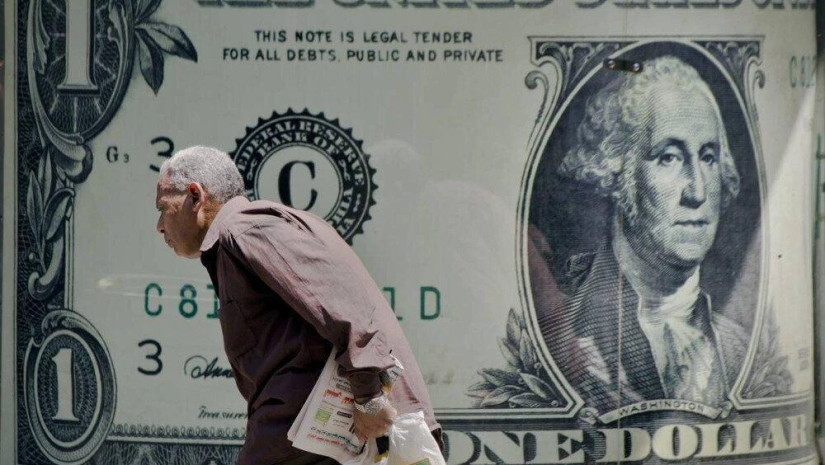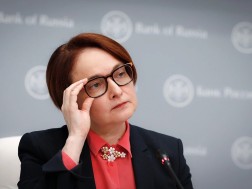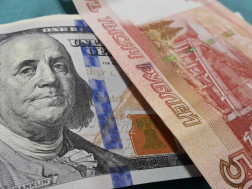Foreign exchange markets have endured a rocky ride in 2022, but in some countries, a combination of geopolitical pressures and central bank missteps has pushed currencies into a “death spiral.”
A stronger dollar over the course of the year, as investors flocked toward the traditional “safe haven” amid the deluge of geopolitical and macroeconomic shocks, has weighed heavily on many emerging market currencies.
Major oil producers and countries with central banks that have hiked interest rates decisively are generally faring better.
Ghana
Steve Hanke, professor of applied economics at Johns Hopkins University, publishes a regular list of the year’s worst-perfoming currencies -- and Ghana’s cedi is near the top.
The cedi hit a fresh record low against the dollar on Wednesday last week, at one stage hitting the 14.24 mark before recovering slightly. It started the year trading at just over 6 cedis to the dollar, according to Refinitiv data, meaning the greenback has strengthened by more than 132% against the West African nation’s currency.
Ghana’s problems include the rising cost of living and an unsustainable debt burden that have forced the government to turn to the International Monetary Fund for assistance, a move uncharacteristically agreed upon by both the ruling and opposition parties.
“The depth of Ghana’s troubles is made even more stark when considering that government officials are willing to take a massive pay cut in an attempt to free up some funding,” Jacques Nel, head of macro at Oxford Economics Africa, said in a recent note.
“However, this financial sacrifice by government officials should not be mistaken for unity among the country’s leaders, with the opposition blatantly waiting for the IMF deal to be approved before gunning for President [Nana] Akufo-Addo’s scalp.”
The latest shock to the currency came as the Bank of Ghana canceled a scheduled foreign exchange auction, and protests have been held in the capital Accra this month demanding the resignation of the president.
“The Bank has been taking a range of measures to stem the currency’s year-long spiral, including an unsuccessful crackdown on unlicensed currency sellers,” explained Murega Mungai, trading desk manager at Nairobi-based AZA Finance.
“It has also been buying dollars directly from mining companies to shore up its reserves, starving the market of much needed liquidity. Against that backdrop, we expect the Cedi to remain under pressure in the near term, possibly weakening beyond the 14.50 level.”
Hanke said on Twitter last week that the cedi is a “central bank junk currency” and suggested the country must “mothball its central bank and install a currency board” in order to restore order.
Zimbabwe, Cuba
The cedi’s decline makes it only the third-worst-performing currency in the world this year, however.
In second place is the Cuban peso, which is down 56.36% against the dollar, behind only the Zimbabwean dollar, which has lost a staggering 76.74% of its value against the dollar since January. Both Zimbabwe and Cuba are suffering from eye-watering levels of inflation.
Hanke said last week that Zimbabwe’s “economic death spiral just keeps spinning.” National statistics agency ZimStat reported that the country’s inflation hit an annual 268% in October, but Hanke’s own estimates place it at 417%. Similar to Ghana, authorities in Zimbabwe have attempted to support the local currency and fight inflation by cracking down on Zimbabwean dollar payments.
Sky-high inflation is also a central problem in Cuba, with Hanke’s model placing consumer price increases at an annual 166%.
Egypt
The Egyptian pound last week slumped to a fresh low against the dollar, sliding to 24.42, making its way onto Hanke’s list of the top 10 worst-performing currencies of 2022.
Fitch Ratings recently cut the country’s credit outlook to negative citing a deteriorating external liquidity position and the risk of diminished bond market access. Meanwhile, Egypt’s foreign exchange reserves had depleted to under $32 billion in October from $35 billion in March.
Fitch highlighted that Egypt’s financing problems were being exacerbated by $6 billion of upcoming external debt maturities next year and a further $9 billion of maturities in 2024.
“Despite a flutter of finance deals announced at COP27 in Sharm el-Sheikh this week, continued foreign exits overall are likely to cause the [Egyptian] Pound to weaken further against the dollar in coming days,” AZA Finance trader Mitch Diedrick said in a research note Thursday.
Other currencies featuring on the list as of last week include the Sri Lankan Rupee, Venezuelan Bolivar, Sierra Leone’s Leone, the Myanmar Kyat, the Laotian Kip and the Ukrainian Hryvnia, CNBC reports.
















